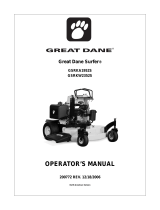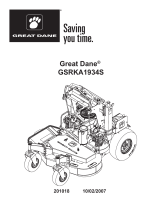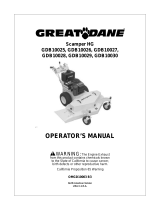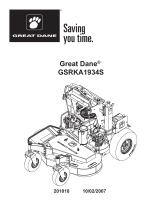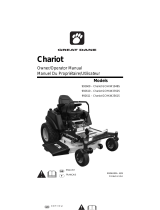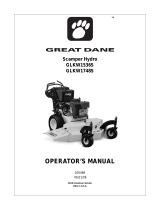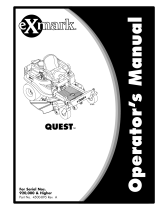Page is loading ...

c WARNING: The Engine Exhaust
from this product contains chemicals known
to the State of California to cause cancer,
birth defects or other reproductive harm.
California Proposition 65 Warning
OMGD10002 B2
D02-106
GD10002
B2
Chariot JR
GDRZ17KAE, GDRZ19KAE, GDRZ23KAE
OPERATOR’S MANUAL
North American Version
Litho in U.S.A.

Introduction
INTRODUCTION
Introduction
Using Your Operator’s Manual
This manual is an important part of your machine and
should remain with the machine when you sell it.
An engine manufacturer’s owner’s manual has been
provided with your machine. This will provide maintenance
and troubleshooting information for the engine installed in
your machine.
Reading your operator’s manual will help you and others
avoid personal injury or damage to the machine.
Information given in this manual will provide the operator
with the safest and most effective use of the machine.
Sections in your operator’s manual are placed in a specific
order to help you understand all the safety messages and
learn the controls so you can operate this machine safely.
You can also use this manual to answer any specific
operating or servicing questions.
The machine shown in this manual may differ slightly from
your machine, but will be similar enough to help you
understand our instructions.
RIGHT-HAND and LEFT-HAND sides are determined by
facing in the direction the machine will travel when going
forward. When you see a broken line (------), the item
referred to is hidden from view.
Special Messages
Your manual contains special messages to bring attention
to potential safety concerns, machine damage, as well as
helpful operating and servicing information. Please read all
the information carefully to avoid injury and machine
damage.
NOTE: General information is given throughout the
manual that may help the operator in the operation or
service of the machine.
Record Identification Numbers
Chariot JR
GDRZ17KAE Serial No. (451000 - 451999)
GDRZ19KAE Serial No. (453000 - 453999)
GDRZ23KAE Serial No. (454000 - 454999)
If you need to contact an Authorized Service Center for
information on servicing, always provide the product model
and serial number.
You will need to locate the model and serial number for the
machine and for the engine of your machine and record the
information in the spaces provided.
DATE OF PURCHASE:
_________________________________________
DEALER NAME:
_________________________________________
DEALER PHONE:
_________________________________________
MX9201
MODEL NUMBER (A):
__ __ __ __ __ __ __ __ __ __ __ __ __ __ __ __ __
SERIAL NUMBER (POWER UNIT) (B):
__ __ __ __ __ __ __ __ __ __ __ __ __ __ __ __ __
ENGINE SERIAL NUMBER (C):
__ __ __ __ __ __ __ __ __ __ __ __ __ __ __ __ __
ENGINE SPECIFICATION NUMBER (C):
__ __ __ __ __ __ __ __ __ __ __ __ __ __ __ __ __
c CAUTION: Avoid injury! This symbol and text
highlight potential hazards or death to the
operator or bystanders that may occur if the
hazards or procedures are ignored.
IMPORTANT: Avoid damage! This text is used to tell
the operator of actions or conditions that might
result in damage to the machine.
B
A
C

Table of Contents
TABLE OF CONTENTS
All information, illustrations and
specifications in this manual are based
on the latest information at the time of
publication. The right is reserved to
make changes at any time without
notice.
COPYRIGHT© 2002
Deere & Co.
John Deere Worldwide Commercial and
Consumer Equipment Division
All rights reserved
Previous Editions
COPYRIGHT© 2001
OMGD10002 B2 - English
Table of Contents
Safety .....................................................................................................................................................................................1
Operating................................................................................................................................................................................7
Replacement Parts ...............................................................................................................................................................11
Service Intervals...................................................................................................................................................................12
Service Lubrication...............................................................................................................................................................13
Service Engine .....................................................................................................................................................................14
Service Transmission............................................................................................................................................................16
Service Mower......................................................................................................................................................................19
Service Electrical..................................................................................................................................................................23
Service Miscellaneous..........................................................................................................................................................26
Troubleshooting ....................................................................................................................................................................28
Storage.................................................................................................................................................................................31
Assembly..............................................................................................................................................................................32
Specifications .......................................................................................................................................................................34
Index.....................................................................................................................................................................................35
Service Record GD ..............................................................................................................................................................36

Safety - 1
SAFETY
Safety
Understanding The Machine Safety Labels
MIF
The machine safety labels shown in this section are placed
in important areas on your machine to draw attention to
potential safety hazards.
On your machine safety labels, the words DANGER,
WARNING, and CAUTION are used with this safety-alert
symbol. DANGER identifies the most serious hazards.
The operator’s manual also explains any potential safety
hazards whenever necessary in special safety messages
that are identified with the word, CAUTION, and the safety-
alert symbol.
DANGER/POISON
MX9292 MX9201
• Shield eyes, explosive gases can cause blindness or
injury.
• No sparks, flames, smoking.
• Sulfuric acid can cause blindness or severe burns.
• Flush eyes immediately with water, get medical help
fast.
• Keep out of the reach of children.
• Do not tip.
• Keep vent caps tight and level.
DANGER
MX9293 MX9214
• Keep hands and feet away.
CAUTION
MX9294 MX9214
• Do not operate mower without chute deflector, mulching
plate or complete grass catcher assembly in position.
• Do not remove grass catcher, mulching plate or raise
the chute deflector until engine and blade(s) have stopped.

Safety - 2
SAFETY
CAUTION
MX9296 MX9214
• Before operating read operators manual and safety
instructions.
CAUTION
MX9295 MX9214
• This product is designed for professional and
commercial users.
• Operation training is required.
• Carefully read safety instructions.
• Know function of controls before operating.
• Practice with cutter blades off until confident.
• Clear mowing area of all debris.
• Keep all guards, covers and shields in place while
working.
• Do not disable or bypass any safety device.
• Always wear safety goggles while operating.
• Always park machine on level surface.
• Avoid contact with cutter blades. They may be rotating.
• Keep children and others clear from area.
• Set ground speed control to safe speed.
• Slowly and smoothly move speed control levers to start
and stop machine.
• Reduce speed and avoid sharp turns.
• Be careful on slopes, do not mow where stability or
traction is in doubt.
• To obtain additional operator manual and safety
instructions, contact your Great Dane dealer or write Great
Dane Power Equipment, 4700 New Middle Rd,
Jeffersonville, IN 47130, USA.
Emission Control System Certification Label
(Small Off-Road Gas Engines)
NOTE: Tampering with emission controls and
components by unauthorized personnel may result in
severe fines or penalties. Emission controls and
components can only be adjusted by EPA and/or
CARB authorized service centers. Contact your Great
Dane Equipment Retailer concerning emission
controls and component questions.
The presence of an emissions label signifies that the
engine has been certified with the United States
Environmental Protection Agency (EPA) and/or California
Air Resources Board (CARB).
The emissions warranty applies only to those engines
marketed by Great Dane that have been certified by the
EPA and/or CARB; and used in the United States and
Canada in off-road mobile equipment.
Emission Compliance Period (Small Off-Road
Gas Engines)
If your engine has the emission compliance category listed
on the emission control system certification or air index
label, this indicates the number of operating hours for
which the engine has been certified to meet EPA and/or
CARB emission requirements. The following table provides
the engine compliance period in hours associated with the
category found on the certification label.
Agency Category Hours
EPA C 250
EPA B 500
EPA A 1000
CARB Moderate 125
CARB Intermediate 250
CARB Extended 500

Safety - 3
SAFETY
Operating Safely
• Inspect machine before you operate. Be sure hardware
is tight. Repair or replace damaged, badly worn, or missing
parts. Be sure guards and shields are in good condition
and fastened in place. Make any necessary adjustments
before you operate.
• Do not operate mower without discharge chute or entire
grass catcher in place.
• Check before each use that operator presence controls
are functioning correctly. Test safety systems. Do not
operate unless they are functioning correctly.
• Do not change the engine governor setting or
overspeed the engine.
• Check brake action before you operate. Adjust or
service brakes as necessary.
• Stop machine if anyone enters the area.
• Never raise mower decks when blades are running.
• If you hit an object, stop and inspect the machine. Make
repairs before you operate. Keep machine and
attachments properly maintained and in good working
order.
• Do not leave machine unattended when it is running.
• Only operate during daylight or with good artificial light.
• Slow down and be careful of traffic when operating near
or crossing roadways. Stop blades before crossing roads
or sidewalks. Use care when approaching blind corners,
shrubs, trees, or other objects that may obscure vision.
• Be aware of the mower discharge direction and make
sure that no one is in the path of the discharge direction.
• Use only accessories and attachments approved by the
manufacturer of the machine.
• Wear close fitting clothing and safety equipment
appropriate for the job.
• Always wear safety goggles or safety glasses with side
shields when operating the mower.
• Wear a suitable protective device such as earplugs.
Loud noise can cause impairment or loss of hearing.
• Do not wear radio or music headphones. Safe service
and operation requires your full attention.
Checking Mowing Area
• Evaluate the terrain to determine what accessories and
attachments are needed to properly and safely perform the
job.
• Clear mowing area of objects that might be thrown.
Keep people and pets out of mowing area.
• Study mowing area. Set up a safe mowing pattern. Do
not mow where traction or stability is doubtful.
• Test drive area with mower lowered but not running.
Slow down when you travel over rough ground.
Parking Safely
1. Stop machine on a level surface, not on a slope.
2. Disengage PTO.
3. Lower attachments to the ground.
4. Lock park brake.
5. Stop engine.
6. Remove key.
7. Wait for engine and all moving parts to stop before you
leave the operator’s station.
Rotating Blades are Dangerous
HELP PREVENT SERIOUS OR FATAL ACCIDENTS:
MIF
• Rotating blades can cut off arms and legs.
• Keep hands, feet and clothing away from mower deck
when engine is running.
• Be alert at all times, drive forward carefully. People,
especially children can move quickly into the mowing area
before you know it.
• Before backing up, shut off PTO and look down and
behind the machine carefully, especially for children.
• Do not mow in reverse.
• Shut off blades when you are not mowing.
• Do not operate machine if you are under the influence of
drugs or alcohol.
• Park machine safely before inspecting or unplugging
mower or bagger.

Safety - 4
SAFETY
PROTECT CHILDREN:
• Never assume that children will remain where you last
saw them. Children are attracted to mowing activity, stay
alert to the presence of children.
• Keep children indoors when you are mowing. Turn the
machine off if a child enters the mowing area.
• Use extra care when you come to blind corners, shrubs,
trees, or other objects that may block your vision.
• Do not let children or an untrained person operate the
machine.
• Do not carry or let children ride on any attachment or
machine even with the blades off. Do not tow children in a
cart or trailer.
Avoid Tipping
• Slopes are a major factor related to loss-of-control and
tip-over accidents, which can result in severe injury or
death.
• Drive across a hill - not up and down. If necessary, turn
slowly and in the downhill direction. Do not shift to neutral
and coast downhill.
• Avoid starting and stopping on a slope. If machine
stops, disengage mower blades and back down slowly.
• Do not drive where machine could slip or tip.
• Stay alert for holes and other hidden hazards in the
terrain.
• Keep away from drop-offs, ditches, and embankments.
• Slow down before you make a sharp turn or operate on
a slope. On gear models, choose a low gear so that shifting
and stopping will not be necessary while on the slope.
• Transport machine with decks lowered to improve
stability.
• Drive machine very slowly and avoid quick stops when
attachment is removed.
• Mowing when grass is wet can cause reduced traction
and sliding.
Keep Riders Off
• Only allow the operator on the machine. Keep riders off.
• Riders on the machine or attachment may be struck by
foreign objects or thrown off the machine causing serious
injury.
• Riders obstruct the operator’s view resulting in the
machine being operated in an unsafe manner.
Checking Wheel Bolts
• A serious accident could occur causing serious injury if
wheel bolts are not tight.
• Check wheel bolt tightness often during the first 100
hours of operation.
• Wheel hardware must be tightened to specified torque
using the proper procedure anytime it is loosened.
Driving Safely on Public Roads
Avoid personal injury or death resulting from a collision with
another vehicle on public roads:
• Use safety lights and devices. Slow moving machines
when driven on public roads are hard to see, especially at
night.
• Use extra care when loading or unloading the machine
into a trailer or truck.
• Whenever driving on public roads, use flashing warning
lights and turn signals according to local regulations. Extra
flashing warning lights may need to be installed.
Practice Safe Maintenance
• Only qualified, trained adults should service this
machine.
• Understand service procedure before doing work. Keep
area clean and dry.
• Never lubricate, service, or adjust machine while it is
moving. Keep safety devices in place and in working
condition. Keep hardware tight.
• Keep hands, feet, clothing, jewelry, and long hair away
from any moving parts, to prevent them from getting
caught.
• Lower attachments to the ground before servicing
machine. Disengage all power and stop the engine. Lock
park brake and remove the key. Let machine cool.
• Disconnect battery or remove spark plug wire before
making any repairs.
• Before servicing machine, carefully release pressure
from components with stored energy such as hydraulic
components.
• Keep all nuts and bolts tightened, especially blade
attachment bolts.
• Securely support any machine elements that must be
raised for service work. Lock service latches before
working on machine with raised attachments.
• Never run engine unless park brake is locked.
• Keep all parts in good condition and properly installed.

Safety - 5
SAFETY
Fix damage immediately. Replace worn or broken parts.
Replace all worn or damaged safety and instruction decals.
• To prevent fires, remove any buildup of grease, oil, or
debris from the machine, especially the engine
compartment.
• Charge batteries in an open, well-ventilated area, away
from sparks. Unplug battery charger before connecting or
disconnecting from the battery. Wear protective clothing
and use insulated tools.
• Do not modify machine or safety devices. Unauthorized
modifications may impair its function and safety.
• Do not wear radio or music headphones while servicing
the machine. Safe service requires your full attention.
Avoid High Pressure Fluids
• Hydraulic hoses and lines can fail due to physical
damage, kinks, age, and exposure. Check hoses and lines
regularly. Replace damaged hoses and lines.
• Hydraulic fluid connections can loosen due to physical
damage and vibration. Check connections regularly.
Tighten loose connections.
• Escaping fluid under pressure can penetrate the skin
causing serious injury. Avoid the hazard by relieving
pressure before disconnecting hydraulic or other lines.
Tighten all connections before applying pressure.
• Search for leaks with a piece of cardboard. Protect
hands and body from high pressure fluids.
• If an accident occurs, see a doctor immediately. Any
fluid injected into the skin must be surgically removed
within a few hours or gangrene may result. Doctors
unfamiliar with this type of injury should reference a
knowledgeable medical source.
Prevent Fires
• Never remove fuel cap, or add fuel with engine running
or hot. Allow engine to cool for several minutes.
• Never store equipment with fuel in the tank inside a
building where fumes may reach an open flame or spark.
• Allow engine to cool before storing in any enclosure.
• To reduce fire hazard, keep engine free of grass,
leaves, or excessive grease.
Tire Safety
Explosive separation of a tire and rim parts can cause
serious injury or death:
• Do not attempt to mount a tire without the proper
equipment and experience to perform the job.
• Always maintain the correct tire pressure. Do not inflate
the tires above the recommended pressure. Never weld or
heat a wheel and tire assembly. The heat can cause an
increase in air pressure resulting in a tire explosion.
Welding can structurally weaken or deform the wheel.
• When inflating tires, use a clip-on chuck and extension
hose long enough to allow you to stand to one side and not
in front of or over the tire assembly.
• Check tires for low pressure, cuts, bubbles, damaged
rims or missing lug bolts and nuts.
Handling Fuel Safely
Fuel and fuel vapors are highly flammable and
explosive:
• Do not refuel machine while you smoke, when machine
is near an open flame or sparks, or when engine is running.
Stop engine and allow to cool before filling.
• Never remove the fuel cap or add fuel with the engine
running.
• Never fill fuel tank or drain fuel from a machine in an
enclosed area. Fill fuel tank outdoors.
• Prevent fires. Clean up spilled fuel immediately.
• Do not store machine with fuel in tank in a building
where fumes may reach an open flame or spark.
• Prevent fire and explosion caused by static electric
discharge. Use only non-metal, portable fuel containers
approved by the Underwriter’s Laboratory (U.L.) or the
American Society for Testing & Materials (ASTM). If using
a funnel, make sure it is plastic and has no screen or filter.
MIF
• Static electric discharge can ignite gasoline vapors in an
ungrounded fuel container. Remove the fuel container from
the bed of a vehicle or the trunk of a car and place on the
ground away from the vehicle before filling. Keep nozzle in
contact with container opening while filling.

Safety - 6
SAFETY
• When practical, remove equipment from trailers or truck
beds and refuel them on the ground. If this is not possible,
use a portable, plastic fuel container to refuel equipment on
a truck bed or trailer.
• For gasoline engines, do not use gas with methanol.
Methanol is harmful to your health and to the environment.

Operating - 7
OPERATING
Operating
Daily Operating Checklist
❏ Test safety systems.
❏ Check tire pressure.
❏ Check fuel level.
❏ Check engine oil level.
❏ Remove and clean engine air filter.
❏ Check transmission reservoir oil level.
❏ Remove grass and debris from machine.
❏ Clean engine cooling air intake screen and cooling fins.
❏ Inspect all belts for damage.
❏ Sharpen and balance mower blades.
❏ Check area below machine for leaks.
Operating Controls
MX9202
A - Park Brake Lever
B - Height-of-Cut (HOC) Adjustment Pin
C - Mower Deck Lift/Lower Lever
D - Mower Deck Transport Position Lock Lever
E - Fuel Shutoff Valve
F - Steering Control Levers
G - Console
Console Controls
MX9230
A - Throttle Lever and Choke Control (Choke
Position Full Forward)
B - Key Switch
C - PTO/Clutch Switch
D - Hourmeter
E - Seat Adjustment Lever
Testing Safety Systems
Use the following checkout procedure to check for normal
operation of machine.
If there is a malfunction during one of these procedures, do
not operate machine. See your Great Dane dealer for
service.
Perform these tests in a clear open area. Keep bystanders
away.
Testing Park Brake Safety Switch
1. Operator must be seated in the seat (seat safety switch
engaged).
2. Move control levers to neutral position.
E
F
A
B
C
D
G
c CAUTION: Avoid injury! Engine exhaust fumes
contain carbon monoxide and can cause
serious illness or death.
Move the vehicle to an outside area before
running the engine.
Do not run an engine in an enclosed area
without adequate ventilation.
• Connect a pipe extension to the engine
exhaust pipe to direct the exhaust fumes out of
the area.
• Allow fresh outside air into the work area to
clear the exhaust fumes out.
A
E
B
D
C

Operating - 8
OPERATING
3. Move PTO/clutch switch to off position.
4. Unlock park brake.
5. Turn key switch to start position.
Result: The engine must not crank.
Testing Park Brake
Stop the machine on a maximum 17° slope. Stop the
engine and lock the park brake.
Result: Park brake must hold the machine stationary. If the
machine moves more than 61 cm [24 in.] in one hour, the
brakes need to be adjusted. See your Great Dane dealer.
Testing Neutral Start Safety Switch
1. Operator must be seated in the seat (seat safety switch
engaged).
2. Move control levers to forward travel position.
3. Move PTO/clutch switch to off position.
4. Lock park brake.
5. Turn key switch to start position.
Result: The engine must not crank.
Testing Seat Safety Switch
1. Operator must be seated in the seat (seat safety switch
engaged).
2. Move control levers to neutral position.
3. Start the engine.
4. Move PTO/clutch switch to on position.
5. Raise slightly off the seat.
Result: The engine must stop.
Testing PTO/Clutch Safety Switch
1. Operator must be seated in the seat (seat safety switch
engaged).
2. Unlock park brake.
3. Move PTO/clutch switch to on position (mower deck
drive engaged).
4. Turn key to start.
Result: The engine must not crank.
Using the Park Brake
Move park brake lever to the raised (locked) position to
lock the park brake. This will also engage the park brake
safety switch.
Starting the Engine
1. Move fuel shutoff valve to on position.
2. Lock park brake.
3. Move control levers to neutral position.
4. Move PTO/clutch switch to off position.
5. Move throttle lever to choke position (past full throttle).
6. Turn key switch to start position for no more than 5
seconds. Release key to the run position when engine
starts.
• If the engine does not start, wait 10 seconds.
• Turn key to start position again for no more than 5
seconds.
• Repeat the procedure if necessary.
7. Let the engine run at half-speed position for several
minutes to warm up before operating the machine.
c CAUTION: Avoid injury! Before engaging
mower, clear area of bystanders, especially
children.
c CAUTION: Avoid injury! Engine exhaust fumes
contain carbon monoxide and can cause
serious illness or death.
Move the vehicle to an outside area before
running the engine.
Do not run an engine in an enclosed area
without adequate ventilation.
• Connect a pipe extension to the engine
exhaust pipe to direct the exhaust fumes out of
the area.
• Allow fresh outside air into the work area to
clear the exhaust fumes out.
IMPORTANT: Avoid damage! Starter may be
damaged if starter is operated for more than 20
seconds at a time:
• Wait 2 minutes before trying again if the engine
does not start.
IMPORTANT: Avoid damage! Unnecessary engine
idling may cause engine damage. Excessive idling
can cause engine overheating, carbon build-up and
poor performance.

Operating - 9
OPERATING
Operating the Machine
1. Adjust mower deck to desired cutting height.
2. Start and warm-up engine at half throttle.
3. Move PTO/clutch switch to on position.
4. Move throttle lever to wide open position.
5. Unlock park brake.
NOTE: The travel speed and turn rate will vary with the
amount that the control levers are moved.
MX9211
6. Drive the machine:
To drive the machine forward: Push both control levers
forward smoothly and evenly.
To turn the machine: Pull the control lever back on the
same side as the direction of the desired turn. Push the
other lever forward.
To stop the machine: Return both control levers to the
neutral position.
To drive the machine in reverse: Pull both control levers
back evenly.
Stopping the Machine
NOTE: If the operator leaves the seat without placing
the PTO switch in the off position, the mower blades
will stop as soon the operator leaves the seat.
1. Move the PTO/clutch switch to the off position.
2. Return both control levers to neutral position.
3. Lock park brake.
4. Move the throttle lever to the half-speed position, and let
the engine run at low throttle for a few seconds.
5. Turn the key switch to the stop position.
6. Remove key.
Adjusting Cutting Height
Cutting height can be adjusted from approximately 25-127
mm (1-5 in.). Each hole adjusts the height of cut (HOC) in
12 mm (1/2 in.) increments.
The deck can also be raised and locked in a transport
position, to provide maximum ground clearance when
moving the machine from one area to another.
MX9212
1. Raise the mower deck lift/lower lever (A) to raise and
latch the deck in the transport position.
2. Position the HOC adjustment pin (B) in the proper hole
for the desired height of cut.
3. Pull back and hold the mower deck lift/lower lever (A)
and release the transport position lock lever (C).
4. Allow the mower deck lift/lower lever (A) to rest against
the HOC adjustment pin.
c CAUTION: Avoid injury! Learn the use of the
control levers. Practice at half throttle until
becoming proficient and comfortable with the
operation of the machine.
Do not move control levers from forward to
reverse or reverse to forward position rapidly.
Sudden direction changes could cause loss of
control or damage the machine.
c CAUTION: Avoid injury! Children or bystanders
may attempt to move or operate an unattended
machine.
Always lock the park brake and remove the
key before leaving the machine unattended.
A
B
C

Operating - 10
OPERATING
Using the Fuel Shutoff Valve
MX9411
Move the fuel shutoff valve (A) to the on position for normal
operation. Move the valve to the off position when the
machine is not in use, and during transport.
Moving the Machine Manually
1. Park machine safely. (See Parking Safely in the Safety
section.)
NOTE: The pumps are located under the machine,
behind the mower deck.
MX9228
Picture Note: Left pump shown.
2. Turn free-wheeling valves (A) on both pumps one full
turn counterclockwise (open position).
3. Unlock park brake.
4. Push machine to desired location. Due to internal
hydraulic system resistance, the machine will move slowly.
5. Turn free-wheeling valves (A) on both pumps one full
turn clockwise (closed position). Tighten the valve to 9-14
N•m (80-120 lb-in.).
6. Lock park brake.
c CAUTION: Avoid injury! With the free-wheeling
valve open, the machine will have unrestricted
motion.
• The machine may free-wheel out of control if
the free-wheeling valve is opened with the
machine on an incline.
• Park the machine on a level surface before
opening the free-wheeling valve.
IMPORTANT: Avoid damage! Transmission damage
may occur if the machine is moved or towed
incorrectly:
• Move unit by hand only.
• Do not use another vehicle to move unit.
• Do not tow unit.
A
A

Replacement Parts - 11
REPLACEMENT PARTS
Replacement Parts
Parts
We recommend Great Dane quality parts available at your
Great Dane dealer.
Part numbers may change; use part numbers listed below
when you order. If a number changes, your dealer will have
the latest number.
When you order parts, your Great Dane dealer needs your
machine model and serial numbers and engine serial
number. These are the numbers that you recorded in the
Product Identification section of this manual.
Part Numbers
(Part numbers are subject to change without notice. Part
numbers may be different outside the U.S.A.)
Item Part Number
Battery D18169
Fuel Tank Cap D18097
Oil Reservoir Cap D18081
Oil Filter (Hydraulic System) D18094
Traction (Hydro) Drive Belt D28125
Engine to Blade Belts:
• 1,22 m (48 in.) Deck
• 1,32 m (52 in.) Deck
D28129
D28179
Mower Blades:
• 42 cm (16.5 in.)
• 45 cm (18 in.)
D18086
D18037

Service Intervals - 12
SERVICE INTERVALS
Service Intervals
Servicing Your Machine
Please use the following timetables to perform routine
maintenance on your machine.
NOTE: The following initial break-in items must be
performed and verified to validate the warranty (dealer
service invoice accepted).
Break-In (After First 8 Hours of Operation)
Change engine oil and filter.
Check drive belt tension.
Check transmission neutral adjustment.
Check wheel nut torque.
Break-In (After First 24 Hours of Operation)
Check drive belt tension.
Break-In (After First 40 Hours of Operation)
Change transmission oil and filter.
Every 40 Hours
Change engine oil.
Grease HOC shafts (five places).
Grease caster wheel pivot bearings (two places).
Grease caster wheel bearings (two places).
Grease mower deck thrust arms (two places).
Grease mower deck spindle bearings (three places).
Remove debris from the underside of the mower deck.
Check all drive belt tension.
Check tire pressure.
Check battery electrolyte level.
Clean engine air filter.
Check wheel nut torque.
Every 160 Hours
Clean and inspect spark plugs.
Change engine oil filter.
Check hydraulic reservoir oil level.
Lubricate mower deck idler pulley pivots (three places).
Lubricate seat platform hinges (two places)
Lubricate pump control arms (five places).
Lubricate control lever pivot shafts (two places).
Lubricate throttle cable.
Lubricate choke control cable.
Every 500 Hours
Change transmission oil and filter.
Annually
Replace all spindle bearings (6).
Replace all mower deck idler pulleys (3).
Remove caster wheel roller bearings; clean and relube.
Replace drive belts; run-in and adjust tension.
Clean power unit.
Change transmission oil and filter.
Check all bolts and nuts; tighten as needed.
Remove battery; clean battery and holder.
Replace spark plugs.
IMPORTANT: Avoid damage! Operating in extreme
conditions may require more frequent service
intervals:
• Engine components may become dirty or
plugged when operating in extreme heat, dust or
other severe conditions.
• Engine oil and spark plugs may lose efficiency if
vehicle is operated constantly at slow or low engine
speeds or with frequent short trips.

Service Lubrication - 13
SERVICE LUBRICATION
Service Lubrication
Grease
Use a general all-purpose grease with an NLGI grade No.2
rating.
Wet or high speed conditions may require use of a special-
use grease. Contact your servicing dealer for information.
Spray Lubricant
Use a general-purpose petroleum-based spray lubricant.
Lubrication Points
MX9214
• Grease caster wheel bearings (A) if equipped.
• Remove, clean and pack the caster wheel bearings (A)
with new grease (for mowers without grease fittings).
• Grease caster wheel pivot bearings (B).
• Grease HOC shafts (C).
• Grease mower deck thrust arms (D) located at the rear
of the mower deck.
• Grease spindle bearings (E) if equipped.
NOTE: Use spray lubricant to lubricate the following
items:
MX9251
• Lubricate mower deck idler pulleys (A-C).
MX9410
• Lubricate hydraulic pump control arms (A).
• Lubricate control lever pivot shaft (B).
• Lubricate seat platform hinges (C).
• Lubricate throttle control cable (D).
IMPORTANT: Avoid damage! If operating outside
that temperature range, contact your servicing
dealer for a special-use grease.
A
B
B
C
D
D
E
E
A
E
A
B
C
C
B
A
D

Service Engine - 14
SERVICE ENGINE
Service Engine
Avoid Fumes
Engine Oil
Use oil viscosity based on the expected air temperature
range during the period between oil changes.
Use oil that meets the following specification:
• API Service Classification SG or higher
Checking Engine Oil Level
NOTE: Check oil twice a day if you run engine over 4
hours in a day.
Make sure engine is cold when checking engine oil
level.
1. Park machine safely. (See Parking Safely in the Safety
section.)
2. Clean area around dipstick to prevent debris from falling
into crankcase.
3. Remove dipstick. Wipe with a clean cloth.
4. Allow dipstick to rest against the top of the tube.
5. Remove dipstick and check oil level on dipstick. Oil must
be between ADD and FULL marks. If oil is low, add oil to
bring oil level no higher than the FULL mark on dipstick. Do
not overfill.
6. Install and tighten dipstick.
Changing Engine Oil and Filter
MX9412
NOTE: An oil drain tube is provided with your machine.
Attach the tube to the oil drain fitting on your engine,
and open the valve (A) to drain the used oil. Close the
valve, and remove the drain tube from the fitting after
the oil has been drained. Store the drain tube after use.
Change engine oil and filter at the intervals recommended
in the Service Intervals section. See the engine
manufacturer’s owner’s manual provided with your
machine for the complete procedure.
Cleaning Air Intake Screen and Engine Fins
Keep air intake screens and engine cooling fins clear of
debris to ensure proper cooling. See the engine
manufacturer’s owner’s manual provided with your
machine for the complete procedure.
Checking and Cleaning Air Filter Elements
c CAUTION: Avoid injury! Engine exhaust fumes
contain carbon monoxide and can cause
serious illness or death.
Move the vehicle to an outside area before
running the engine.
Do not run an engine in an enclosed area
without adequate ventilation.
• Connect a pipe extension to the engine
exhaust pipe to direct the exhaust fumes out of
the area.
• Allow fresh outside air into the work area to
clear the exhaust fumes out.
IMPORTANT: Avoid damage! Failure to check the oil
level regularly could lead to serious engine
problems if oil level is low:
• Check oil level before operating.
• Check oil level when the engine is cold and not
running.
• Keep level between the FULL and the ADD marks.
• Shut off engine before adding oil.
IMPORTANT: Avoid damage! The engine is air-
cooled and requires a large amount of air intake
when running. Reduced air intake can cause
overheating:
• Keep air intake screen and cooling fins clean.
• Keep covers and screens in place.
c CAUTION: Avoid injury! Touching hot surfaces
can burn skin. The engine and components will
be hot if the engine has been running. Allow
the engine to cool before servicing.
A

Service Engine - 15
SERVICE ENGINE
Check and clean air filter elements at the intervals
recommended in the Service Intervals section. See the
engine manufacturer’s owner’s manual provided with your
machine for the complete procedure.
Checking Spark Plug
Check spark plugs at the intervals recommended in the
Service Intervals section. See the engine manufacturer’s
owner’s manual provided with your machine for the
complete procedure.
Adjusting Carburetor
NOTE: Carburetor is calibrated by the engine
manufacturer and is not adjustable.
If engine is operated at altitudes above 1829 m (6,000
ft), some carburetors may require a special high
altitude main jet.
If engine is hard to start or runs rough, see the
troubleshooting section of the engine manufacturer’s
owner’s manual provided with your machine.
Possible engine surging will occur at high throttle with
transmission in neutral and mower disengaged. This is a
normal condition due to the emission control system.
After performing the checks in the troubleshooting section
and your engine is still not performing correctly, contact the
local engine manufacturer’s authorized servicing dealer.
Replacing Fuel Filter
1. Park machine safely. (See Parking Safely in the Safety
section.)
2. Turn fuel shutoff valve to off position.
3. Disconnect the fuel hose from the outlet side of the fuel
filter, and drain gasoline into a properly marked container.
4. Remove the fuel filter from the inlet fuel hose. Discard
filter.
5. Connect a new fuel filter to hoses.
6. Turn fuel shutoff valve to the on position.
IMPORTANT: Avoid damage! Dirt and debris can
enter the engine through a damaged filter element:
• Do not wash paper element.
• Do not attempt to clean paper element by tapping
against another object.
• Do not use pressurized air to clean element.
• Replace element only if it is very dirty, damaged
or the seal is cracked.
c CAUTION: Avoid injury! Touching hot surfaces
can burn skin. The engine and components will
be hot if the engine has been running. Allow
the engine to cool before servicing.
c CAUTION: Avoid injury! Fuel vapors are
explosive and flammable:
• Do not smoke while handling fuel.
• Keep fuel away from flames or sparks.
• Shut off engine before servicing.
• Cool engine before servicing.
• Work in a well-ventilated area.
• Clean up spilled fuel immediately.
IMPORTANT: Avoid damage! When installing a new
fuel filter, the filter arrow must be pointing in the
direction of fuel flow.

Service Transmission - 16
SERVICE TRANSMISSION
Service Transmission
Avoid Fumes
Transmission Oil
Use only Quaker State® 5W-50 or Mobil-1® 15W-50 all
synthetic oil.
Checking Transmission Oil Level
1. Park machine safely. (See Parking Safely in the Safety
section.)
2. Remove the hydraulic reservoir cap; the oil level should
be 76 mm (3 in.) from the top of the filler pipe.
Changing Transmission Oil and Filter
1. Park machine safely. (See Parking Safely in the Safety
section.)
2. Allow engine and hydraulic reservoir to cool.
3. Clean area around filler cap, and remove the filler cap
from the reservoir.
MX9229
4. Turn hydraulic filter (A) counterclockwise to remove and
drain oil into a properly marked container with a capacity of
at least 7.5 L (2.0 gal.).
5. Apply a film of clean oil to gasket of new filter.
6. Install filter. Turn filter clockwise until gasket makes
contact with the mounting surface. Tighten 1/2 to 3/4 turn
after contact.
NOTE: Reservoir capacity is approximately 1.9 L (2 qt).
Total system capacity is approximately 3.3 L (3.5 qt).
7. Fill reservoir with approximately 1.9 L (2 qt) of oil.
8. Install reservoir cap.
9. Bleed air from hydraulic system.
Adjusting Transmission Neutral Position
1. Park machine safely. (See Parking Safely in the Safety
section.)
2. Raise drive wheel off the ground and securely support
the machine and block caster wheels.
3. Start and run the engine until it reaches normal
operating temperature.
4. Observe wheel movement as control levers are moved
back and forth. The wheels should travel in the correct
direction as the levers are moved.
c CAUTION: Avoid injury! Engine exhaust fumes
contain carbon monoxide and can cause
serious illness or death.
Move the vehicle to an outside area before
running the engine.
Do not run an engine in an enclosed area
without adequate ventilation.
• Connect a pipe extension to the engine
exhaust pipe to direct the exhaust fumes out of
the area.
• Allow fresh outside air into the work area to
clear the exhaust fumes out.
IMPORTANT: Avoid damage! Contamination of
hydraulic fluid could cause transmission damage or
failure. Do not open oil reservoir cap unless
absolutely necessary.
c CAUTION: Avoid injury! Machine must be
safely supported on jackstands before
removing or installing wheels. Do not use a
hoist or floor jack to support the machine.
A

Service Transmission - 17
SERVICE TRANSMISSION
MX9247
5. Move control levers to neutral position; the wheels
should stop rotating. If the wheels continue to rotate, adjust
the neutral adjustment knob(s) (A) located on each side of
the seat until wheel(s) stop rotating.
MX9249
6. Adjust neutral switch activator bolt(s) (B) as needed.
The switches should be engaged when the control levers
are in the neutral position.
7. Shut engine off.
8. Lower the machine to the ground.
Removing and Installing Traction Drive Belt
1. Park machine safely. (See Parking Safely in the Safety
section.)
2. Remove mower deck drive belt.
MX9232
Picture Note: Drive belt routing as viewed from the
top of machine.
3. Disconnect tension spring (A) from the anchor pin.
4. Remove drive belt (B).
5. Install new drive belt (B).
6. Connect tension spring (A) to anchor pin.
7. Install mower deck drive belt.
Bleeding Hydraulic System
NOTE: Whenever hydraulic components are removed
from the system, hoses are disconnected, or the
system has been drained, trapped air must be removed
from the hydraulic system.
1. Park machine safely. (See Parking Safely in the Safety
section.)
A
B
c CAUTION: Avoid injury! Escaping fluid under
pressure can penetrate the skin causing
serious injury. Avoid the hazard by relieving
pressure before disconnecting hydraulic or
other lines. Tighten all connections before
applying pressure. Search for leaks with a
piece of cardboard. Protect hands and body
from high pressure fluids.
Use caution when filling and draining hydraulic
oil. During periods of machine operation, the
hydraulic oil reservoir can get hot. Allow
engine and oil reservoir to cool before
servicing.
IMPORTANT: Avoid damage! Contamination of
hydraulic fluid could cause transmission damage or
failure. Do not open oil reservoir cap unless
absolutely necessary.
Severe or unusual conditions may require a more
frequent service interval.
A
B
/



